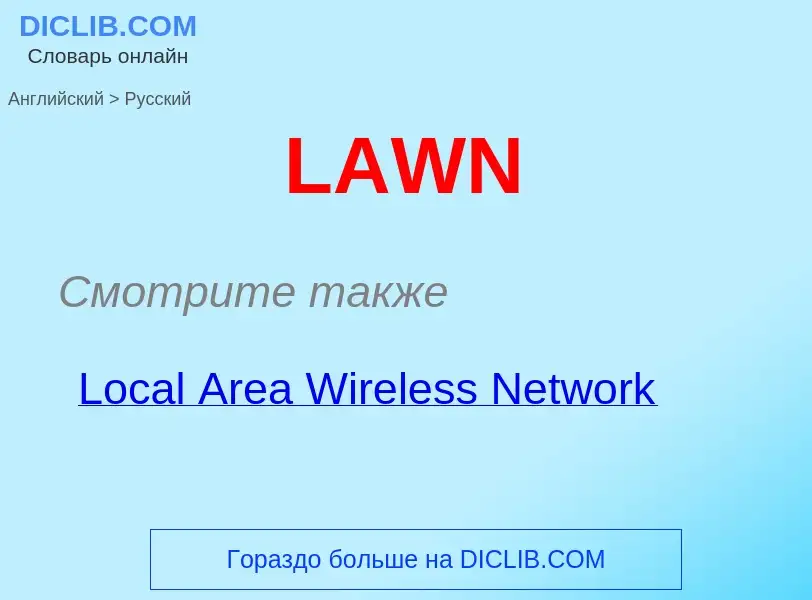Μετάφραση και ανάλυση λέξεων από την τεχνητή νοημοσύνη ChatGPT
Σε αυτήν τη σελίδα μπορείτε να λάβετε μια λεπτομερή ανάλυση μιας λέξης ή μιας φράσης, η οποία δημιουργήθηκε χρησιμοποιώντας το ChatGPT, την καλύτερη τεχνολογία τεχνητής νοημοσύνης μέχρι σήμερα:
- πώς χρησιμοποιείται η λέξη
- συχνότητα χρήσης
- χρησιμοποιείται πιο συχνά στον προφορικό ή γραπτό λόγο
- επιλογές μετάφρασης λέξεων
- παραδείγματα χρήσης (πολλές φράσεις με μετάφραση)
- ετυμολογία
LAWN - translation to ρωσικά
Смотрите также
[lɔ:n]
общая лексика
газон
газонный
линобатист
лужайка
Смотрите также
существительное
[lɔ:n]
общая лексика
лужайка с подстриженной травой
газон
площадка с травяным покрытием
батист
лужайка, газон
поэтическое выражение
прогалина
полянка (в лесу и т. п.)
синоним
Βικιπαίδεια

A lawn is an area of soil-covered land planted with grasses and other durable plants such as clover which are maintained at a short height with a lawnmower (or sometimes grazing animals) and used for aesthetic and recreational purposes—it is also commonly referred to as part of a garden. Lawns are usually composed only of grass species, subject to weed and pest control, maintained in a green color (e.g., by watering), and are regularly mowed to ensure an acceptable length. Lawns are used around houses, apartments, commercial buildings and offices. Many city parks also have large lawn areas. In recreational contexts, the specialised names turf, pitch, field or green may be used, depending on the sport and the continent.
The term "lawn", referring to a managed grass space, dates to at least than the 16th century. With suburban expansion, the lawn has become culturally ingrained in some areas of the world as part of the desired household aesthetic. However, awareness of the negative environmental impact of this ideal is growing. In some jurisdictions where there are water shortages, local government authorities are encouraging alternatives to lawns to reduce water use. Researchers in the United States have noted that suburban lawns are "biological deserts" that are contributing to a "continental-scale ecological homogenization." Lawn maintenance practices also cause biodiversity loss in surrounding areas.


![A [[croquet]] lawn at a club in [[Edinburgh]], Scotland A [[croquet]] lawn at a club in [[Edinburgh]], Scotland](https://commons.wikimedia.org/wiki/Special:FilePath/Croquetplayers.jpg?width=200)
![Dethatching]] removes dead grass and decomposing materials that build up in a lawn Dethatching]] removes dead grass and decomposing materials that build up in a lawn](https://commons.wikimedia.org/wiki/Special:FilePath/Dethatcher2.jpg?width=200)

![The lawn at [[Kirkby Fleetham]] Hall, Yorkshire, England, circa 1889 The lawn at [[Kirkby Fleetham]] Hall, Yorkshire, England, circa 1889](https://commons.wikimedia.org/wiki/Special:FilePath/Kirby Fleetham Hall, Yorkshire, UK, lawn, 1889.jpg?width=200)

![summerhouse]] summerhouse]]](https://commons.wikimedia.org/wiki/Special:FilePath/Lötstugan Bärbo Nyköpings kommun.jpg?width=200)
![A high school principal caring for the school lawn; from a 1916–1917 yearbook in [[Sturgeon Bay, Wisconsin]] A high school principal caring for the school lawn; from a 1916–1917 yearbook in [[Sturgeon Bay, Wisconsin]]](https://commons.wikimedia.org/wiki/Special:FilePath/Mr. Soukup all in a days work.jpg?width=200)
![Aeration]] is one method used to maintain a lawn Aeration]] is one method used to maintain a lawn](https://commons.wikimedia.org/wiki/Special:FilePath/Plug Aerator2.jpg?width=200)
![petrol-powered]] lawnmower, 1902 petrol-powered]] lawnmower, 1902](https://commons.wikimedia.org/wiki/Special:FilePath/Ransomes00.gif?width=200)
![Ransomes]]. Ransomes]].](https://commons.wikimedia.org/wiki/Special:FilePath/Ransomes01.jpg?width=200)
![A typical [[lawn-mowing bot]] maintaining even and low grass A typical [[lawn-mowing bot]] maintaining even and low grass](https://commons.wikimedia.org/wiki/Special:FilePath/Robomow 110 City 2012-06-05.jpg?width=200)
![dethatching]] in addition to leaves, twigs, pine needles, etc. dethatching]] in addition to leaves, twigs, pine needles, etc.](https://commons.wikimedia.org/wiki/Special:FilePath/Smartsweep.jpg?width=200)
![ATV]]s to spread seed or fertilizer ATV]]s to spread seed or fertilizer](https://commons.wikimedia.org/wiki/Special:FilePath/Spreader AF.jpg?width=200)
![Gardens of the [[Château de Vaux-le-Vicomte]], designed by [[André Le Nôtre]] at [[Maincy]] Gardens of the [[Château de Vaux-le-Vicomte]], designed by [[André Le Nôtre]] at [[Maincy]]](https://commons.wikimedia.org/wiki/Special:FilePath/Vaux-le-Vicomte Garten.jpg?width=200)
